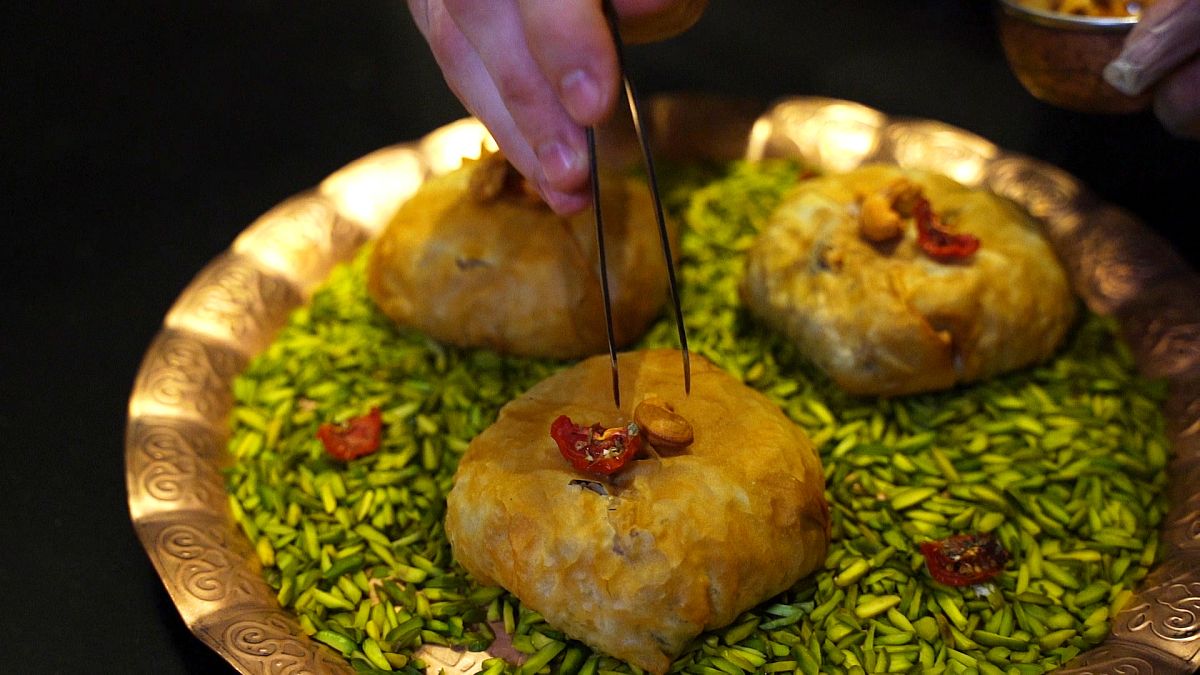Chef Abdullah Alsallak welcomed Euronews to the Fairmont Hotel in Dubai, where he prepared a dish infused with flavours from his homeland, Jordan. Chef Alsallak pays tribute to his mothers’ Syrian heritage by adding his own twist to a dish that is popular across the Arabic region.
This recipe is Ouzi Surar. Its main ingredients are flavourful lamb and rice, wrapped in crispy filo pastry.
Originally, the filo pastry was used as a form of packaging instead of using a bag or container. This made it a popular 'on-the-go' food for nomadic Bedouins and poorer people. Today, it is commonly cooked for events such as weddings and banquets as it is relatively easy to cook in large quantities.
Different variants of this recipe can be found across the Arabic region. In the UAE and Oman, it is known as ‘Shuwaa’ and instead of the filo pastry, date and palm leaves were traditionally used to cook it in a submerged oven.
In neighbouring Saudi Arabia, it is called ‘Madfoon’ and aluminium foil is commonly used in the cooking process.
Hailing from a family of chefs, Abdullah told Euronews that there has always been a competitive streak to his cooking. This particular recipe has been handed down through generations, but he adds his own ingredients to give it a modern twist for the foodies of Dubai.
You can find the recipe below if you would like to cook up your own version of ‘Ouzi Sarar’.
Ingredients:
To cook the meat:
300g diced lamb
6 cardamom pods
½ tsp mastic
4 cloves
Half a cinnamon stick
10 black peppercorns
1pcs carrot
1pcs celery
1pcs onion
Instructions
Heat the olive oil in a large pot and brown the meat pieces on all sides. Remove any excess liquid; add spices and enough water to cover the meat by two inches.
Once the water boils, remove any impurities and cover. Then lower the heat and cook until tender. Once cooked, strain the meat and reserve the stock for the rice.
To make the rice, heat the vegetable oil in a large pot. Add the minced meat and cook until browned. Drain any excess liquid and add the spices and peas, carrot, sweet corn and mushroom.
Crumble the stock cube and add to the meat mixture.
Add the rice and mix well, making sure each grain is coated with oil.
Add the stock from the meat, adding water if it is not enough to cover the rice.
Once it comes to the boil, lower the heat to the lowest setting, cover and let the rice cook. Taste the stock when it comes to the boil and adjust the seasoning and spices to your taste.
Once the rice is cooked, allow it to cool almost completely.
To make the filo pastry, use a small bowl; brush it with melted ghee and place one filo sheet in it. Brush the filo sheet lightly with ghee again then add another, making sure the entire circumference of the bowl’s edges are covered with filo.
Brush the second filo sheet with ghee then layer pieces of meat, toasted nuts, and then enough rice to fill the bowl.
Press down lightly and then use the filo sheets to cover the rice, brushing them with ghee to act as glue.
Bake in the oven at 200C until brown and crispy.






